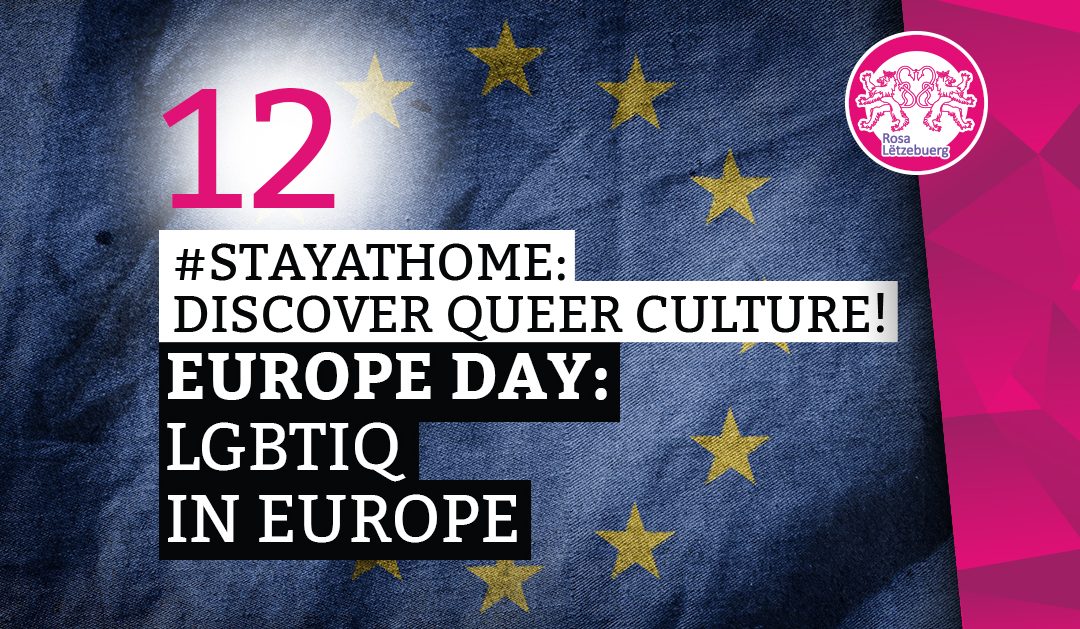#StayAtHome & discover the queer culture! In view of the difficult times in which we have to limit social contact, our free time is restricted to our four walls! That’s why we want to show you tips for articles, portraits, interviews or documentaries in the coming days and weeks! Here you can find a list of all the recent posts!
Despite coming from different origines and cultures, we are all united under the European flag even if the EU in its current constitution does not give the best picture of itself. Many people have a stake in the fact that we are all supposed to live better and better. Many rights and changes have been achieved and, as a result, groups and institutions have been set up. Today we celebrate the Europe day, 63 years after the European Economic Community was created.
Europe Day held on 9 May every year celebrates peace and unity in Europe. The date marks the anniversary of the historic ‚Schuman declaration‚. At a speech in Paris in 1950, Robert Schuman, born in Luxembourg, the then French foreign minister, set out his idea for a new form of political cooperation in Europe, which would make war between Europe’s nations unthinkable.
His vision was to create a European institution that would pool and manage coal and steel production. A treaty creating such a body was signed just under a year later. Schuman’s proposal is considered to be the beginning of what is now the European Union.
What has the EU done for LGBTIQ?
The last 5 years, the European Union continued to invest in LGBTIQ+ rights. They published a List of actions to advance LGBTI Equality, with the goal to increase the social acceptance of LGBTI people and their inclusion in EU and accession countries’ policy in the areas of non-discrimination, education, employment, health, free movement, asylum, hate speech/hate crime, enlargement and foreign policy. For the upcoming years, the EU will continue to implement this list. Additionally, there were special initiatives for Euro Pride 2017 and IDAHOBIT 2016. The European Court also voted positively for the freedom of movement for same-sex couples in 2018, allowing family reunification rights for any EU-citizen. In that same year, it was decided that asylum seekers don’t have to undertake any special testing to validate their sexual orientation. A big survey was also launched to acquire more data on LGBTIQ+ individuals in Europe. The EU has also some ambitious plans regarding protection and discrimination, violence, hate crimes & hate speech, freedom of movement, rainbow families, LGBTIQ+ refugees and asylum seekers, education, health, human rights in particular for Trans and Intersex individuals, LGBTIQ+ rights outside the EU, support to civil society and the Brexit. For more information, we refer to the following articles:
LGBTIQ on an european level
We have come a long way since then and along the way, different organizations were founded to defend the rights of LGBTIQ+ people on an international level:
- The European Parliament Intergroup on LGBTI Rights: This group of members of the European Parliament is monitoring the work of the European Union with special attention to LGBTIQ+ people in EU Member States and beyond while liaising with civil society groups to relay their concerns on a European level. Marc Angel, Member of the European Parliament from Luxembourg, which is also member of Rosa Lëtzebuerg, is currently Co-President of the Intergroup.
- The European Union Agency for fundamental rights (FRA) who have a specific part in the EU Charter of Fundamental Rights to cover LGBTIQ+ rights. The FRA is organizing in 2013 and in 2019 a europe wide survey to identify how lesbian, gay, bisexual and transgender people living in the European Union experience the fulfilment of their fundamental rights. The second round of the survey (EU-LGBTI II) is currently underway, and the results will be published in 2020. This will collect comparable data in order to compare the results with the prior survey. Rosa Lëtzebuerg was entrusted as local partner to distribute this survey in Luxembourg.
- ILGA-EUROPE: The oldest important organization is the International Lesbian, Gay, Bisexual, Trans and Intersex Association, which established itself in Europe in 1996. ILGA-Europe advocates for human rights and equality, strategic litigation and tries to strengthen the LGBTIQ+ movement within Europe. One of their most know features is the yearly Rainbow Map, scoring countries based on their pro-LGBTIQ+ policies and strategies. Luxembourg ranked third in 2019, but there is still a lot of work to be done. Rosa Lëtzebuerg has been a member of ILGA-Europe for many years and contributes each year to the annual report with information about the situation of the LGBTIQ+ community in Luxembourg.
- EPOA: The European Pride Organization Association was founded in 1991 with the specific goal to promote Lesbian, Gay, Bisexual, Transgender and Intersex Prides on a pan-European level. They also try to empower and support both local and national pride organizations as a celebration, but also as a vital human rights movement. EOPA facilitates networking, skill-sharing, trainings, seminars and webinars for all of its members. The EPOA is giving the license holder of the Europride, which will be organized every year by an EPOA-Member.
- TGEU: In 2005, two new organizations emerged. One of them is Transgender Europe (TGEU), aiming to create change on European level to improve the lives of Trans people on a local level. They represent this community politically and publicly, while advocating for their human rights. Unfortunately, this year’s Europride in Thessaloniki is cancelled due to the Covid 19 crisis. Instead, Global Pride will take place as a livestream in cooperation with Interpride. Rosa Lëtzebuerg, respectively Luxembourg Pride is involved in this and will contribute content.

